Canon EF 28mm f/2.8 IS USM Review
-
Ease
of Use -
Sample
Images -
Lens
Specs -
Rating &
Conclusion -
Main
Rivals -
Review
Roundup - Comment
-
More…

Introduction
Announced earlier this year, the EF 28mm f/2.8 IS USM is a fast wide-angle lens for Canon's full-frame and APS-C DSLRs. Featuring Super Spectra coatings, an ultrasonic focus motor, a circular aperture, silent high-speed AF performance, full-time manual focusing and image stabilisation offering a claimed 4-stop advantage, the new Canon 28mm f/2.8 is ideal for landscape and reportage photography. The Canon EF 28mm f/2.8 IS USM is available now for £729.99 / $799.99 in the UK and the USA respectively.
Ease of Use
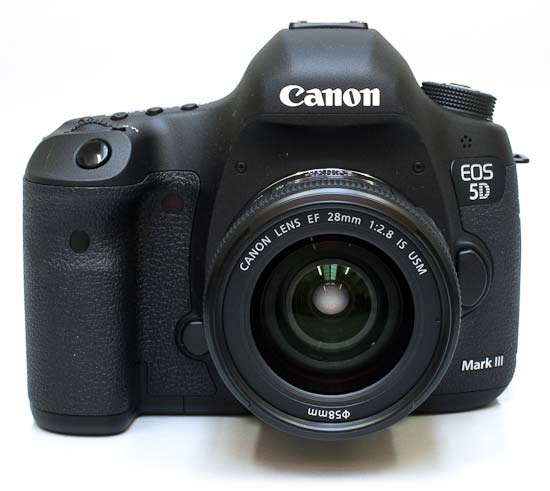 The Canon EF 28mm f/2.8 IS USM lens
The Canon EF 28mm f/2.8 IS USM lens
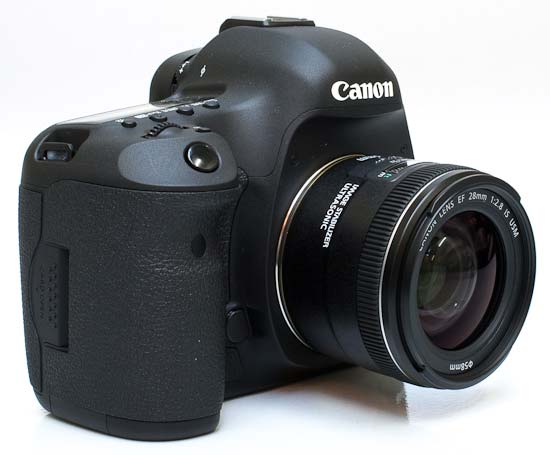 The Canon EF 28mm f/2.8 IS USM lens, isometric view
The Canon EF 28mm f/2.8 IS USM lens, isometric view
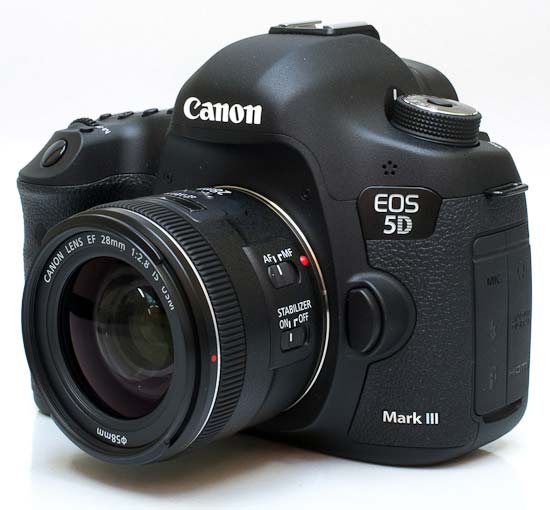 The Canon EF 28mm f/2.8 IS USM lens, isometric view
The Canon EF 28mm f/2.8 IS USM lens, isometric view
For a wide-angle prime, the Canon EF 28mm f/2.8 IS USM isn't too big and bulky, and not too heavy either at 260g. While you can use it on a smaller APS-C body for a 45mm equivalent angle of view, it won't balance quite so well - as demonstrated by the images above, it's a much better match for a professional-grade, full-frame camera like the 5D Mark III.
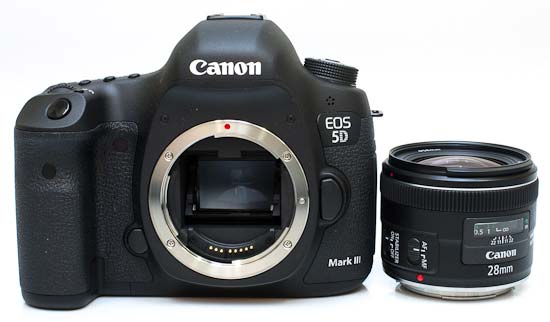 The Canon EF 28mm f/2.8 IS USM lens alongside the EOS 5D Mark III
The Canon EF 28mm f/2.8 IS USM lens alongside the EOS 5D Mark III
As you would expect from a lens that costs this much, build quality is very good, despite lacking the "L" moniker that denotes Canon's premium lenses. The Canon EF 28mm f/2.8 IS USM feels solid in your hand, even if the outer barrel and the filter thread appear to be made from plastic. The focusing ring is just as wide as it needs to be, and has a ridged, rubberised grip band. It has no aperture ring, which is no big deal unless you wanted to use it on a very old film body.
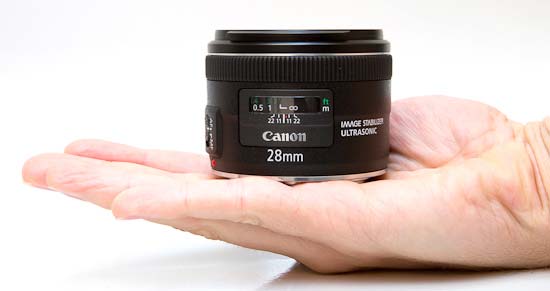 Front of the Canon EF 28mm f/2.8 IS USM lens, in-hand
Front of the Canon EF 28mm f/2.8 IS USM lens, in-hand
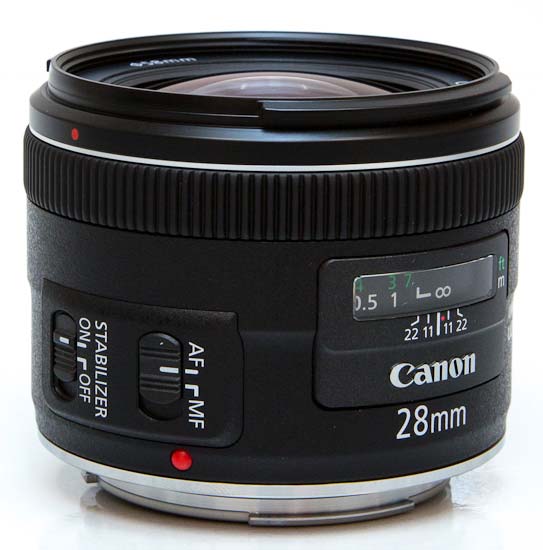 Front of the Canon EF 28mm f/2.8 IS USM lens
Front of the Canon EF 28mm f/2.8 IS USM lens
The lens features a distance scale complete with a DOF scale, although the latter is of limited use, having markings for f/11 and f/22 only. Still, certainly better than nothing. There's also a small red dot that appears to be an infrared focus index.
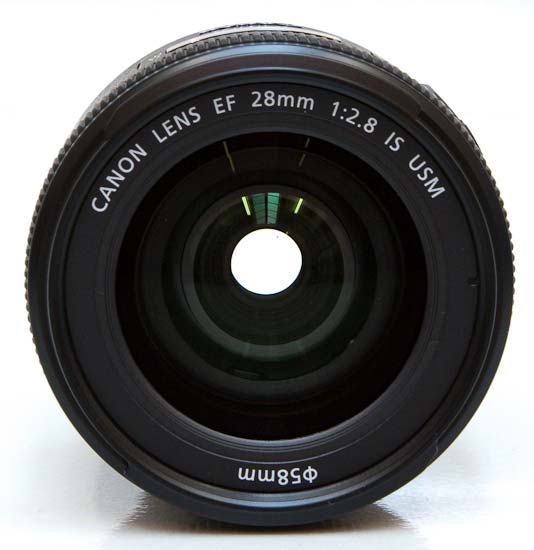 Front of the Canon EF 28mm f/2.8 IS USM lens
Front of the Canon EF 28mm f/2.8 IS USM lens
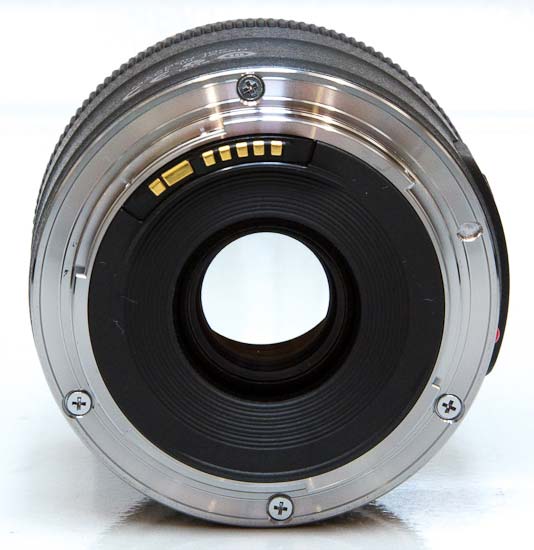 Rear of the Canon EF 28mm f/2.8 IS USM lens
Rear of the Canon EF 28mm f/2.8 IS USM lens
The Canon EF 28mm f/2.8 IS USM boasts Image Stabilisation which Canon claims offers an advantage of up to 4 f-stops over lenses without a stabilizer. This is activated via the On/Off switch on the side of the lens. If the camera body supports it, Canon's IS technology is also able to detect intentional panning movement and automatically switch from the Normal IS mode to the Panning IS mode.
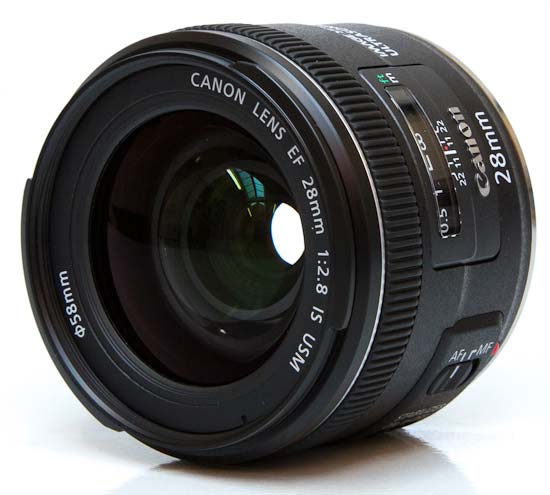 Front of the Canon EF 28mm f/2.8 IS USM lens
Front of the Canon EF 28mm f/2.8 IS USM lens
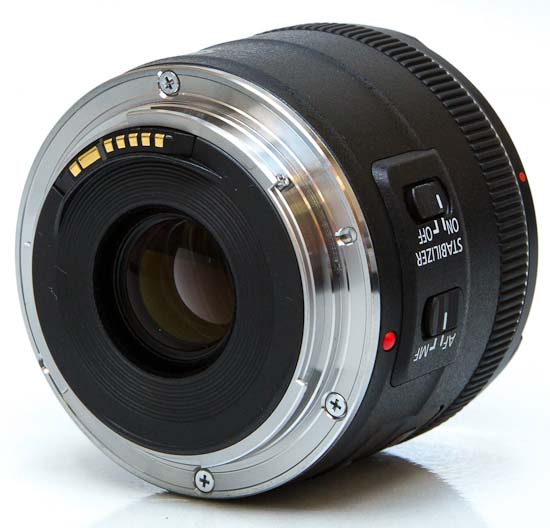 Rear of the Canon EF 28mm f/2.8 IS USM lens
Rear of the Canon EF 28mm f/2.8 IS USM lens
The only other control on the lens barrel is a focus mode switch with the usual AF/MF settings. Note that this lens offers full-time manual focusing even when AF is selected.
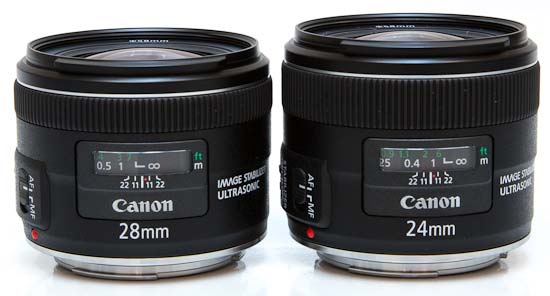 The Canon EF 28mm f/2.8 IS USM lens alongside the EF 28mm f/2.8 IS USM lens
The Canon EF 28mm f/2.8 IS USM lens alongside the EF 28mm f/2.8 IS USM lens
The lens doesn't ship with either a lens hood or a protective bag, a shame given the high price.
Auto-focus
The Canon EF 28mm f/2.8 IS USM features an Ultra Sonic Motor (USM) which provides virtually silent and high-speed auto-focusing. Focusing is fully internal, meaning the length of the lens always remains constant. In use, we found the focusing to be indeed very quiet, and pretty fast - but definitely not instantaneous - with the lens mounted to a Canon 5D Mark III body.
Chromatic Aberrations
Chromatic aberrations, typically seen as purple or blue fringes along contrasty edges, are impressively well controlled with this lens - the examples below show the worst-case scenario.
 |
 |
Light Fall-off
With the lens wide open at f/2.8, you can see some very noticeable light fall-off in the corners. Stopping down helps, although to completely get rid of this phenomenon, you will need to use an f-stop of f/5.6 or smaller.

Macro
The Canon EF 28mm f/2.8 IS USM is not a macro lens. The close-focus point is at 23cm from the film/sensor plane, and Canon quotes a maximum reproduction ratio of 0.2x for the lens. The following example illustrates how close you can get to the subject, in this case a CompactFlash card.
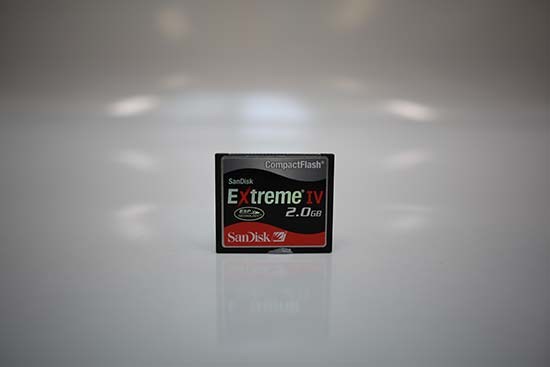 Close-up performance
Close-up performance
Bokeh Examples
Bokeh is a word used for the out-of-focus areas of a photograph, and is usually described in qualitative terms, such as smooth / creamy / harsh etc. One of the reason to buy a fast lens is to be able to isolate the subject from the background, which is normally very hard to do with a wide-angle lens. Canon was apparently very much aware of this requirement, as they employed an iris diaphragm with 7 rounded blades for a pleasing rendering of the out-of-focus highlights. Based on what we have seen, we can say that they largely succeeded. Below you'll find some examples, but you are also encouraged to check out our sample images.
 |
 |
 |
 |
Sharpness
In order to show you how sharp this lens is, we are providing 100% crops on the following page.
-
Ease
of Use -
Sample
Images -
Lens
Specs -
Rating &
Conclusion -
Main
Rivals -
Review
Roundup - Comment
